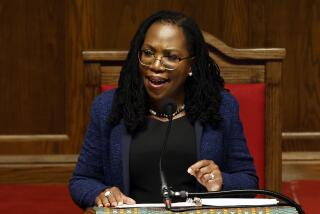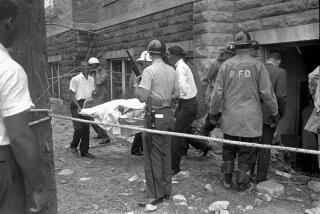Ala. Church Bombing Trial Opens
BIRMINGHAM, Ala. — For 39 years, Bobby Frank Cherry, a truck-driving former Ku Klux Klansman, hovered just outside the reach of the law.
Even though there were stacks of FBI files implicating him in the 1963 church bombing that killed four black girls, he was never prosecuted.
Until now.
Today, in a heavily protected underground courtroom in downtown Birmingham, the long-awaited trial opens with Cherry, a creaky 71, facing four counts of first-degree murder.
After a week of sifting through potential jurors, lawyers Monday selected 16 people to hear the case--including four black men but no black women. Twelve will sit as jurors, with four alternates.
“This case is so well-known, we didn’t have a single potential juror who hadn’t heard about it,” said Circuit Judge James Garrett, presiding over the trial. “We’re counting on jurors to rise to the occasion and just listen to the evidence.”
Cherry, who had been living quietly in Texas before he was indicted, is the third man to be tried in connection with the dynamiting of Birmingham’s 16th Street Baptist Church on Sept. 15, 1963. In many ways this trial will be a repeat of May 2001, when another aged former klansman, Thomas E. Blanton Jr., was tried on the same charges, convicted and sentenced to life in prison in front of the same judge, with the same prosecutors and some of the same evidence.
In that trial, the most damaging evidence was old reel-to-reel audio tapes, made by FBI agents, in which Blanton bragged about his fondness of bombing. There is no similar taped evidence against Cherry, but prosecutors will put on witnesses to testify about hearing Cherry discuss bombings.
Cherry and Blanton were supposed to be tried together, but Garrett delayed trial for Cherry because of questions about his mental competency. Defense experts testified that dementia had eaten away Cherry’s memory to the point that he couldn’t remember the names of ex-wives and was unable to help his defense.
In July, Garrett ruled Cherry was unfit for trial. Outraged civil rights groups marched in the streets, protesting the decision.
Prosecutors appealed the ruling, putting on psychological experts who said that from their interviews with Cherry, they believed he was faking.
In January, Garrett reversed himself and ordered Cherry tried.
On Monday evening, as he visited with reporters in his chambers and prepared for the first day of the trial, the usually affable judge turned sour when asked about the pressure to try Cherry.
“To imply the judge was pressured, that there were nonlegal reasons to have a trial,” he said, “is an affront to me and to the court.”
More to Read
Sign up for Essential California
The most important California stories and recommendations in your inbox every morning.
You may occasionally receive promotional content from the Los Angeles Times.










